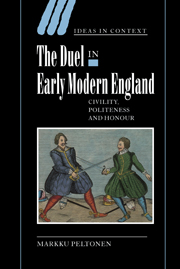Book contents
- Frontmatter
- Contents
- Acknowledgements
- Introduction
- 1 The rise of civil courtesy and the duelling theory in Elizabethan and early Stuart England
- 2 The Jacobean anti-duelling campaign
- 3 Duelling, civility and honour in Restoration and Augustan England
- 4 Anti-duelling campaigns 1660–1720
- 5 Politeness, duelling and honour in Bernard Mandeville
- Epilogue
- Bibliography
- Index
- IDEAS IN CONTEXT
4 - Anti-duelling campaigns 1660–1720
Published online by Cambridge University Press: 22 September 2009
- Frontmatter
- Contents
- Acknowledgements
- Introduction
- 1 The rise of civil courtesy and the duelling theory in Elizabethan and early Stuart England
- 2 The Jacobean anti-duelling campaign
- 3 Duelling, civility and honour in Restoration and Augustan England
- 4 Anti-duelling campaigns 1660–1720
- 5 Politeness, duelling and honour in Bernard Mandeville
- Epilogue
- Bibliography
- Index
- IDEAS IN CONTEXT
Summary
ANTI-DUELLING CAMPAIGNS
Of duelling, the royalist divine Richard Allestree noted in 1667, ‘there are too many, and too noted instances since our restoration’. John Oldmixon, as we have seen, concurred and saw the high frequency of duels after the Restoration as a backlash against Cromwell's anti-duelling policies. According to the Scottish divine John Cockburn, the situation had changed dramatically by 1660. Then ‘Swords being put on by all as a Badge of the Recovery of Liberty’ and duels were soon running riot. The reason, Cockburn thought, was not far to seek: ‘For the Loyalists and old Cavaliers could not forbear reflecting on the Persons and Families tainted with the former Rebellion.’
As with other social vices, many were convinced that duelling was always seriously on the increase. By the end of 1684 John Evelyn noted in his diary that ‘so many horrid murders and duels were committed about this time as were never before heard of in England; which gave much cause of complaint and murmurings’. By the early eighteenth century Cockburn thought that the situation was getting out of hand. Everyone was almost daily exposed to injuries and insults. ‘What the next Generation will prove God knows, but the present is most crooked and perverse’, he wrote. After yet another decade the situation was even worse – at least if we are to believe the critics of duelling.
- Type
- Chapter
- Information
- The Duel in Early Modern EnglandCivility, Politeness and Honour, pp. 201 - 262Publisher: Cambridge University PressPrint publication year: 2003

